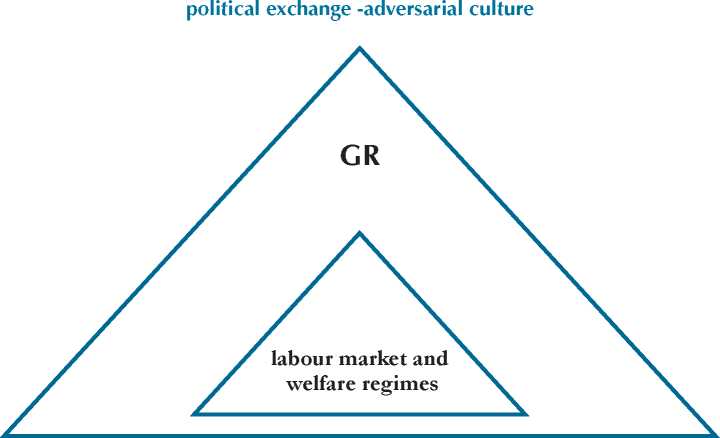Flexibility and security: an asymmetrical relationship?
Diagram 11: The institutional environment

weak institutions
unawareness of
the issues at stake
(unaccountability, anomy)
The differences amongst the citizens of the 4 countries under consideration in their degree of
confidence in a number of domestic institutions and public policy issues are striking. According to
recent Eurobarometer findings (Eurobarometer 70, autumn 2008), the citizens of Denmark and
the Netherlands are the ones with the greater degree of trust in their institutions (central and local
government, political parties, Parliament, legal system) and the policies delivered by state authori-
ties in a number of areas (health care, unemployment benefits, pensions, poverty and inequalities,
functioning of the public administration). By contrast, the Greek public opinion projects a deep and
widespread dissatisfaction —that is growing overtime- with the general situation that prevails in the
country, including the quality of public services. Moreover, Greek citizens believe that their country
is the taillight of the European Union, as they rate the situation in a series of domains to be worse
than in other European Union member States. Whilst they express increasing distrust in the national
government, parliament, the political parties, the local authorities and the legal system, European
Union institutions get a confidence vote. Spain occupies an intermediate position in the continuum,
usually close to the EU average.
Page • 91
More intriguing information
1. The name is absent2. Estimating the Technology of Cognitive and Noncognitive Skill Formation
3. AMINO ACIDS SEQUENCE ANALYSIS ON COLLAGEN
4. Strengthening civil society from the outside? Donor driven consultation and participation processes in Poverty Reduction Strategies (PRSP): the Bolivian case
5. Spatial patterns in intermunicipal Danish commuting
6. The name is absent
7. The name is absent
8. The name is absent
9. Financial Markets and International Risk Sharing
10. How do investors' expectations drive asset prices?